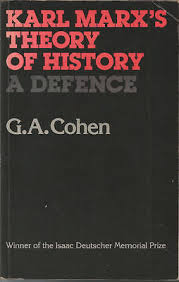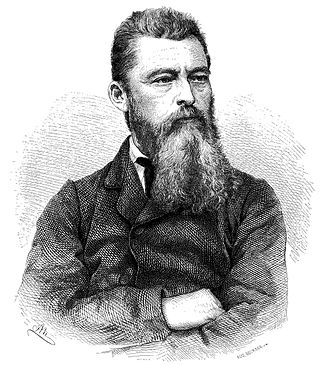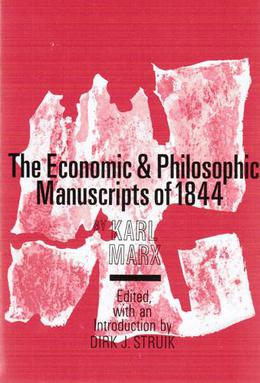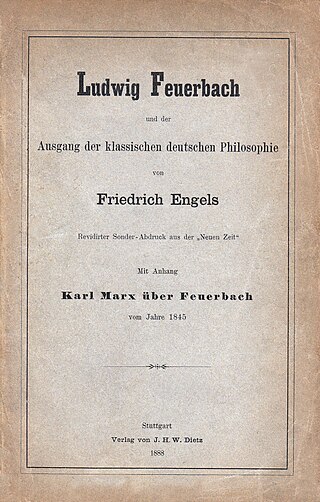
Karl Marx was a German-born philosopher, political theorist, economist, historian, sociologist, journalist, and revolutionary socialist. His best-known works are the 1848 pamphlet The Communist Manifesto and his three-volume Das Kapital (1867–1894); the latter employs his critical approach of historical materialism in an analysis of capitalism, in the culmination of his intellectual endeavours. Marx's ideas and their subsequent development, collectively known as Marxism, have had enormous influence on modern intellectual, economic and political history.
Materialism is a form of philosophical monism which holds that matter is the fundamental substance in nature, and that all things, including mental states and consciousness, are results of material interactions of material things. According to philosophical materialism, mind and consciousness are caused by physical processes, such as the neurochemistry of the human brain and nervous system, without which they cannot exist. Materialism directly contrasts with monistic idealism, according to which consciousness is the fundamental substance of nature.

Karl Marx's theory of alienation describes the separation and estrangement of people from their work, their wider world, their human nature, and their selves. Alienation is a consequence of the division of labour in a capitalist society, wherein a human being's life is lived as a mechanistic part of a social class.
Norman Geras was a political theorist and Professor Emeritus of Politics at the University of Manchester. He contributed to an analysis of the works of Karl Marx in his book Marx and Human Nature and the article "The Controversy About Marx and Justice". His "Seven Types of Obloquy: Travesties of Marxism", appeared in the Socialist Register in 1990.
Some Marxists posit what they deem to be Karl Marx's theory of human nature, which they accord an important place in his critique of capitalism, his conception of communism, and his materialist conception of history. Marx does not refer to human nature as such, but to Gattungswesen, which is generally translated as "species-being" or "species-essence". According to a note from Marx in the Manuscripts of 1844, the term is derived from Ludwig Feuerbach's philosophy, in which it refers both to the nature of each human and of humanity as a whole.

Influences on Karl Marx are generally thought to have been derived from three main sources, namely German idealist philosophy, French socialism and English and Scottish political economy.

For Marx is a 1965 book by the philosopher Louis Althusser, a leading theoretician of the French Communist Party (PCF), in which the author reinterprets the work of the philosopher Karl Marx, proposing an epistemological break between the young, Hegelian Marx, and the old Marx, the author of Das Kapital (1867–1883). The book, first published in France by François Maspero, established Althusser's reputation. The texts presented in For Marx are theoretical interventions in a definite conjuncture, particularly aiming at the definition of the lines to be pursued by the PCF after Stalin's years in the Soviet Union. Althusser's position is of theoretical antihumanism, and is against the teleology of history. Althusser defends that history is a process without subject and with an open end, but that has determinations that can be theorized by the science of history as constructed by Marx in his mature work, Das Kapital. Society is then conceptualized as a complex whole articulated in dominance by the economy where several social practices co-exist with a relative autonomy, introducing the concept overdetermination to characterize the levels of effectivity.

The Concept of Nature in Marx is a 1962 book by the philosopher Alfred Schmidt. First published in English in 1971, it is a classic account of Karl Marx's ideas about nature.
Marxist humanism is an international body of thought and political action rooted in a humanist interpretation of the works of Karl Marx. It is an investigation into "what human nature consists of and what sort of society would be most conducive to human thriving" from a critical perspective rooted in Marxist philosophy. Marxist humanists argue that Marx himself was concerned with investigating similar questions.

Karl Marx's Theory of History: A Defence is a 1978 book by the philosopher G. A. Cohen, the culmination of his attempts to reformulate Karl Marx's doctrines of alienation, exploitation, and historical materialism. Cohen, who interprets Marxism as a scientific theory of history, applies the techniques of analytic philosophy to the elucidation and defence of Marx's materialist conception of history.

The correct place of Karl Marx's early writings within his system as a whole has been a matter of great controversy. Some believe there is a break in Marx's development that divides his thought into two periods: the "Young Marx" is said to be a thinker who deals with the problem of alienation, while the "Mature Marx" is said to aspire to a scientific socialism.
Marxist–Leninist atheism, also known as Marxist–Leninist scientific atheism, is the antireligious element of Marxism–Leninism. Based upon a dialectical-materialist understanding of humanity's place in nature, Marxist–Leninist atheism proposes that religion is the opium of the people; thus, Marxism–Leninism advocates atheism, rather than religious belief.

Ludwig Andreas von Feuerbach was a German anthropologist and philosopher, best known for his book The Essence of Christianity, which provided a critique of Christianity that strongly influenced generations of later thinkers, including Charles Darwin, Karl Marx, Sigmund Freud, Friedrich Engels, Mikhail Bakunin, Richard Wagner, Frederick Douglass, and Friedrich Nietzsche.
Classical Marxism is the body of economic, philosophical, and sociological theories expounded by Karl Marx and Friedrich Engels in their works, as contrasted with orthodox Marxism, Marxism–Leninism, and autonomist Marxism which emerged after their deaths. The core concepts of classical Marxism include alienation, base and superstructure, class consciousness, class struggle, exploitation, historical materialism, ideology, revolution; and the forces, means, modes, and relations of production. Marx's political praxis, including his attempt to organize a professional revolutionary body in the First International, often served as an area of debate for subsequent theorists.

The Economic and Philosophic Manuscripts of 1844, also known as the Paris Manuscripts or as the 1844 Manuscripts, are a series of unfinished notes written between April and August 1844 by Karl Marx. They were compiled and published posthumously in 1932 by the Soviet Union's Marx–Engels–Lenin Institute. They were first published in their original German in Berlin, and there followed a republication in the Soviet Union in 1933, also in German.
Marxist philosophy or Marxist theory are works in philosophy that are strongly influenced by Karl Marx's materialist approach to theory, or works written by Marxists. Marxist philosophy may be broadly divided into Western Marxism, which drew from various sources, and the official philosophy in the Soviet Union, which enforced a rigid reading of what Marx called dialectical materialism, in particular during the 1930s. Marxist philosophy is not a strictly defined sub-field of philosophy, because the diverse influence of Marxist theory has extended into fields as varied as aesthetics, ethics, ontology, epistemology, social philosophy, political philosophy, the philosophy of science, and the philosophy of history. The key characteristics of Marxism in philosophy are its materialism and its commitment to political practice as the end goal of all thought. The theory is also about the struggles of the proletariat and their reprimand of the bourgeoisie.
Dialectical materialism is a materialist theory based upon the writings of Karl Marx and Friedrich Engels that has found widespread applications in a variety of philosophical disciplines ranging from philosophy of history to philosophy of science. As a materialist philosophy, Marxist dialectics emphasizes the importance of real-world conditions and the presence of functional contradictions within and among social relations, which derive from, but are not limited to, the contradictions that occur in social class, labour economics, and socioeconomic interactions. Within Marxism, a contradiction is a relationship in which two forces oppose each other, leading to mutual development.

The "Theses on Feuerbach" are eleven short philosophical notes written by Karl Marx as a basic outline for the first chapter of the book The German Ideology in 1845. Like the book for which they were written, the theses were never published in Marx's lifetime, seeing print for the first time in 1888 as an appendix to a pamphlet by his co-thinker Friedrich Engels. The document is best remembered for its epigrammatic 11th and final thesis, "Philosophers have only interpreted the world, in various ways; the point, however, is to change it", which is engraved on Marx's tomb.

History and Class Consciousness: Studies in Marxist Dialectics is a 1923 book by the Hungarian philosopher György Lukács, in which the author re-emphasizes the philosopher Georg Wilhelm Friedrich Hegel's influence on the philosopher Karl Marx, analyzes the concept of "class consciousness," and attempts a philosophical justification of Bolshevism.
Historical materialism is Karl Marx's theory of history. Marx located historical change in the rise of class societies and the way humans labor together to make their livelihoods.










